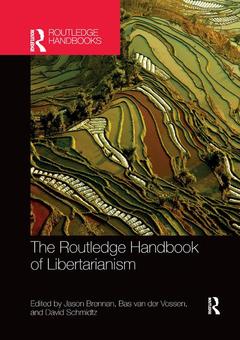Description
The Routledge Handbook of Libertarianism
Routledge Handbooks in Philosophy Series
Coordinators: Brennan Jason, van der Vossen Bas, Schmidtz David
Language: English
Subject for The Routledge Handbook of Libertarianism:
Keywords
Full Liberal Ownership; Exception Rights; Sufficiency Threshold; Collective Decision Procedure; Self-ownership Thesis; Hohfeldian Claim Rights; Murray Rothbard; Nozick’s Proviso; Basic Economic Liberties; Project Pursuer; Michael Huemer; High Liberals; Libertarian Theory; Freeman’s Critique; Egalitarian Liberals; Grotius; Hugo Grotius; Philosophical Social Democrats; Private Governance; Economic Liberties; Classical Liberal; Good Life; Den Uyl; Self-ownership Rights; Justified State Coercion
Publication date: 12-2019
· 17.4x24.6 cm · Paperback
Publication date: 08-2017
· 17.4x24.6 cm · Hardback
Description
/li>Contents
/li>Biography
/li>
Libertarians often bill their theory as an alternative to both the traditional Left and Right. The Routledge Handbook of Libertarianism helps readers fully examine this alternative without preaching it to them, exploring the contours of libertarian (sometimes also called classical liberal) thinking on justice, institutions, interpersonal ethics, government, and political economy. The 31 chapters--all written specifically for this volume--are organized into five parts. Part I asks, what should libertarianism learn from other theories of justice, and what should defenders of other theories of justice learn from libertarianism? Part II asks, what are some of the deepest problems facing libertarian theories? Part III asks, what is the right way to think about property rights and the market? Part IV asks, how should we think about the state? Finally, part V asks, how well (or badly) can libertarianism deal with some of the major policy challenges of our day, such as immigration, trade, religion in politics, and paternalism in a free market. Among the Handbook's chapters are those from critics who write about what they believe libertarians get right as well as others from leading libertarian theorists who identify what they think libertarians get wrong. As a whole, the Handbook provides a comprehensive, clear-eyed look at what libertarianism has been and could be, and why it matters.
TABLE OF CONTENTS
Acknowledgements
Introduction
Libertarianism in conversation with other theories
- Learning from libertarianism: thanks from an unrepentant social democrat
- Libertarianism without Locke
- Hayekian Classical Liberalism
- Democracy and equality versus libertarianism and classical liberalism
- Kant’s Liberalism
- What’s Wrong with Libertarianism? The Meritocratic Diagnosis
- Liberal Libertarians: Why Libertarianism is a Liberal View
- Liberal and Illiberal Libertarianism
- Feminism and the Libertarian Self-Ownership Thesis
- Self-love, justice, and cooperation
- Exception Rights
- The Sufficiency Proviso: A Case for Moderate Libertarianism
- Liberty: A PPE Approach
- The Myths of the Self-Ownership Thesis
- Social Contractarianism
- What can be for sale?
- Property Rights: Natural, Conventional, or Hybrid?
- Is Wealth Redistribution a Rights Violation?
- Trade
- Non-Libertarian Defenses of Economic Rights as Basic Rights
- Ideal Theory
- Private Goverance
- Libertarianism and the Welfare State
- Government failure and market failure
- Freedom and Knowledge
- The Libertarian Case for Open Borders
- Religion and Politics
- A Libertarian Approach to Medicine
- Tolerance
- Paternalism and The Limits of Liberty
- Free markets and exploitation
Richard W. Miller
Jacob Levy
Gerald Gaus
Richard Arneson
Chris W. Suprenant
Thomas Mulligan
Peter J. Boettke and Rosolino A. Candela
Samuel Freeman
Questioning libertarian principles
Ann Cudd
Eric Mack
Nicolás Maloberti
Fabian Wendt
Jason Brennan
Jason Brennan and Bas van der Vossen
John Thrasher
The role of property and the market:
Peter Martin Jaworski
Anna Stilz
Michael Huemer
Fernando Tesón
Queralt
What is the role of the state?
Samuel Freeman
Edward Peter Stringham
Matt Zwolinski
Michael Munger
Ilya Somin
Applied libertarian issues:
Javier Hidalgo
Kevin Vallier
Jessica Flanigan
Ryan Muldoon
Sarah Conly
Hillel Steiner
Jason Brennan is the Robert J. and Elizabeth Flanagan Family Chair of Strategy, Economics, Ethics, and Public Policy at the McDonough School of Business, Georgetown University, where he teaches courses in the intersection of politics, philosophy, and economics. He is the author or co-author of seven books, including Against Democracy (2016), Markets without Limits, with Peter Jaworski (2015), and Why Not Capitalism? (2014).
Bas van der Vossen is Associate Professor of Philosophy in the Smith Institute of Political Economy and Philosophy, Chapman University. He is the author, together with Fernando Tesón, of Debating Humanitarian Intervention (2017).
David Schmidtz is Kendrick Professor of Philosophy at the College of Social & Behavior Sciences and Eller Chair of Service-Dominant Logic at the College of Management, the University of Arizona. He is the author, co-author, or co-editor of 14 book publications.




